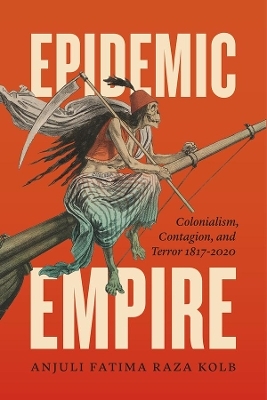
Epidemic Empire
Colonialism, Contagion, and Terror, 1817 - 2020
Seiten
2021
University of Chicago Press (Verlag)
978-0-226-73935-9 (ISBN)
University of Chicago Press (Verlag)
978-0-226-73935-9 (ISBN)
Terrorism is a cancer, an infection, an epidemic, a plague. For more than a century, this metaphor has figured insurgent violence as contagion in order to contain its political energies. In Epidemic Empire, Anjuli Fatima Raza Kolb shows that this trope began in responses to the Indian Mutiny of 1857 and tracks its tenacious hold through 9/11 and beyond. The result is the first book-length study to approach the global war on terror from a postcolonial literary perspective.
Raza Kolb assembles a diverse archive from colonial India, imperial Britain, French and independent Algeria, the postcolonial Islamic diaspora, and the neo-imperial United States. Anchoring her book are studies of four major writers in the colonial-postcolonial canon: Rudyard Kipling, Bram Stoker, Albert Camus, and Salman Rushdie. Across these sources, she reveals the tendency to imagine anti-colonial rebellion, and Muslim fanaticism specifically, as a virulent form of social contagion. The metaphor surfaces again and again in old ideas like the decadence of Mughal India, the poor hygiene of the Arab quarter, and the "failed states" of postcolonialism. Exposing the long history of this broken but persistent narrative, Epidemic Empire is a major contribution to the rhetorical history of our present moment.
Raza Kolb assembles a diverse archive from colonial India, imperial Britain, French and independent Algeria, the postcolonial Islamic diaspora, and the neo-imperial United States. Anchoring her book are studies of four major writers in the colonial-postcolonial canon: Rudyard Kipling, Bram Stoker, Albert Camus, and Salman Rushdie. Across these sources, she reveals the tendency to imagine anti-colonial rebellion, and Muslim fanaticism specifically, as a virulent form of social contagion. The metaphor surfaces again and again in old ideas like the decadence of Mughal India, the poor hygiene of the Arab quarter, and the "failed states" of postcolonialism. Exposing the long history of this broken but persistent narrative, Epidemic Empire is a major contribution to the rhetorical history of our present moment.
Anjuli Fatima Raza Kolb is associate professor of English at the University of Toronto.
List of Figures
Preface: Politics and Scholarship in a Time of Pandemic
Introduction: “Islam,” Terrorism, and the Epidemic Imaginary
Part One: The Disease Poetics of Empire
Chapter 1: Great Games
Chapter 2: The Blue Plague
Chapter 3: Circulatory Logic
Part Two: The Body Allegorical in French Algeria
Chapter 4: The Brown Plague
Chapter 5: Algeria Ungowned
Part Three: Viral Diaspora and Global Security
Chapter 6: Selfistan
Chapter 7: Cures from Within
Acknowledgments
Notes
Bibliography
Index
| Erscheinungsdatum | 02.02.2021 |
|---|---|
| Sprache | englisch |
| Maße | 6 x 9 mm |
| Themenwelt | Sonstiges ► Geschenkbücher |
| Geisteswissenschaften ► Sprach- / Literaturwissenschaft ► Anglistik / Amerikanistik | |
| Geisteswissenschaften ► Sprach- / Literaturwissenschaft ► Literaturwissenschaft | |
| ISBN-10 | 0-226-73935-X / 022673935X |
| ISBN-13 | 978-0-226-73935-9 / 9780226739359 |
| Zustand | Neuware |
| Haben Sie eine Frage zum Produkt? |
Mehr entdecken
aus dem Bereich
aus dem Bereich
Poetik eines sozialen Urteils
Buch | Hardcover (2023)
De Gruyter (Verlag)
CHF 83,90
Buch | Softcover (2024)
belleville (Verlag)
CHF 27,95


